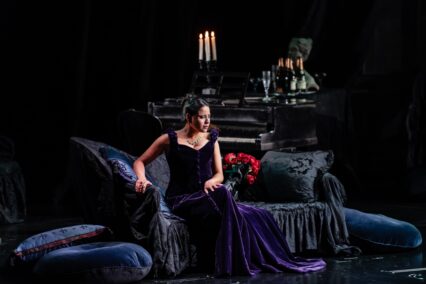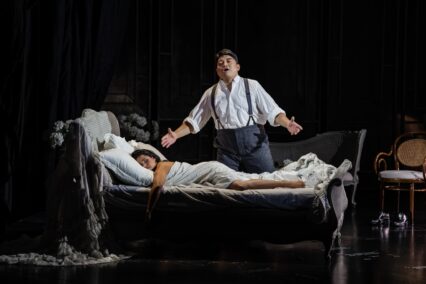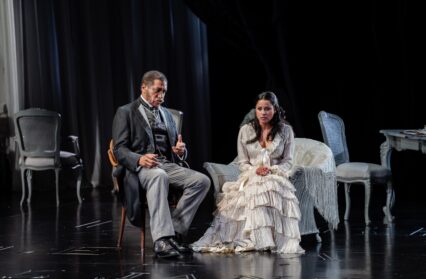Emma Schofield explores Welsh National Opera’s revival of Verdi’s seminal work, La Traviata, and finds much to enjoy in the tradition and simplicity of the production.
Sometimes there’s nothing wrong with a healthy dose of tradition, which is exactly what the Welsh National Opera have offered up in this poignant, but lively revival of David McVicar’s production of La Traviata. For those not familiar with Verdi’s opera, the plot centres on the tragic story of Violetta, a courtesan who falls in love with the passionate Alfredo, only to find herself forced to make the ultimate sacrifice and give up his love, before succumbing to illness in the show’s closing act. It’s a premise which, somewhat unusually for an opera, places almost its entire focus on the plight of its female protagonist.
It’s fair to say that the show is completely stolen by Australian-Mauritian soprano Stacey Alleaume, who is outstanding as Violetta, knowing when to unleash the full power of her voice and when to draw on the softness which lies beneath Violetta’s confident exterior. That balance is particularly notable in the opening act, which sees Violetta switching between the extravagant gaiety of the party she is hosting and the sombre realisation that her illness is progressing. Alleaume centres her performance on the emotion of Violetta’s first encounter with Alfredo, and her efforts to rebuff his affection, a choice which works in part because of Alleaume’s own visibly impassioned commitment to the role.

That commitment is on display in spades in Act 2, where the tension ramps up as Violetta is confronted by Alfredo’s father, Giorgio Germont. The role of Germont is played superbly in this production by Mark S Doss who manages to capture both the torment of a father who is torn between his two children, and the arrogance of a man who is so clearly used to getting his own way, no matter what the cost to others. The fraught exchange between Violetta and Germont is one of the highlights of the production, played out against the backdrop of Violetta’s increasing fears about her health. The threat of tragedy is never far away in this production of La Traviata and in this scene, the heavy black curtains which hang at the back of the stage feel jarringly at odds with the white of Violetta’s dress and the hope which characterises her declarations of love for Alfredo. On which note, it’s impossible not to mention the set for this production, which beautifully mirrors the decadence and absurdity of nineteenth-century Paris, while cleverly drawing on minimal props. There are no gimmicks in the staging and the cast are allowed the space to move freely, which contributes to the natural feel in the exchanges. As Act 2 returns us to Flora’s house for the opera’s pivotal scene, we also see just why the WNO decided to draw on the skills of choreographer Sirena Tocco, with the energy dancers lending a further authentic feel to the setting.

This is also the point at which we really see David Junghoon Kim’s Alfredo come to the fore. It’s an assured performance from Kim, who is no stranger to the role and who tackles the emotional turbulence of Alfredo’s character with confidence. The emotional connection between Kim and Alleaume is especially palpable in the closing act, with Kim finding the balance between grief and love as he holds Violetta through her final moments.
If there were to be an area of weakness in this particular production, it would be that some of the stark realities of Violetta’s life are lost in the subtlety with which her story is told. The difficulties of her social position, work and life are not made explicit, although this is, to a certain extent, negated by Alleaume’s own rendering of a woman whose path has not been an easy one. The rawness of her despair in her death scene is further enhanced by moving supporting performances from Martin Lloyd as Dr Grenvil and Sian Menir as the loyal Annina.
There have been numerous reimaginings of La Traviata over the years, some met with mixed reviews, so it is perhaps fitting that the WNO have taken the opportunity to revive a production which allows the story room to breathe and to be exactly what it was intended: a poignant commentary on the contradictions of a society in which women were, all too often, little more than commodities and a deep-dive into the pain of love lost and a life cut short. As plots go, it certainly lacks complexity, but it more than makes up for that in emotional depth. Much of the music will be recognisable, even to those new to the opera, (it also features in the movie Pretty Woman, which shares a number of parallels with the plot of La Traviata) and the simplicity of the narrative means that the score shines through.
La Traviata plays at venues across the UK until November 25th. Further information is available here.











